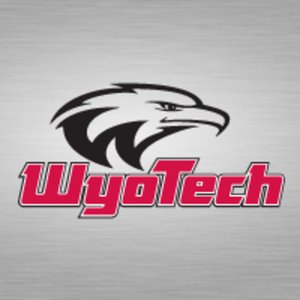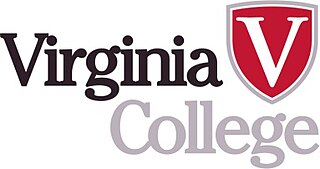
A student loan is a type of loan designed to help students pay for post-secondary education and the associated fees, such as tuition, books and supplies, and living expenses. It may differ from other types of loans in the fact that the interest rate may be substantially lower and the repayment schedule may be deferred while the student is still in school. It also differs in many countries in the strict laws regulating renegotiating and bankruptcy. This article highlights the differences of the student loan system in several major countries.
DeVry University is a private for-profit university with its headquarters in Naperville, Illinois. It was founded in 1931 by Herman A. DeVry and is accredited by the Higher Learning Commission. DeVry is predominantly an online educator but does have campuses in the United States.
The Art Institutes (AI) were a private for-profit system of art schools in the United States.

WyoTech, formerly known as Wyoming Technical Institute, is a for-profit, technical college founded in Laramie, Wyoming in 1966. WyoTech provides 3 core programs and 6 specialty programs that prepare students for careers as technicians in the automotive and diesel industry.

Stevens–Henager College was a private college headquartered in Ogden, Utah which was founded in 1891 and closed abruptly in August 2021. It was one of four educational institutions affiliated with the Salt Lake City–based Center for Excellence in Higher Education (CEHE). Established in 1891, the college had campuses in Idaho and Utah. It offered online and on-campus programs for associate degrees, bachelor's degrees, and master's degrees.
Corinthian Colleges, Inc. (CCi) was a for-profit post-secondary education company in North America. Its subsidiaries offered career-oriented diploma and degree programs in health care, business, criminal justice, transportation technology and maintenance, construction trades, and information technology. A remnant of the schools was owned by ECMC under the Altierus Career College brand until the last three campuses were closed in 2022.

CDI College is a private, for-profit career college in Canada. It offers programs in the business, technology and health care fields. The college has 23 campus locations in five Canadian provinces: six in British Columbia, eight in Alberta, one in Manitoba, four in Ontario and five in Quebec. The school has been owned by the Eminata Group since 2007. A 2022 investigation by CBC reported that some recruiters for CDI College lied to applicants about program accreditation and the post-graduation hiring rates of its students.
Everest University was an American private university based in Florida. From 2015 to 2020, the schools were operated by nonprofit Zenith Education Group, after former for-profit owner Corinthian Colleges shut down its operations. It was founded in 1940 as Fort Lauderdale College of Business and Finance and later known as the Florida Metropolitan University, a name it held until 2010. The Florida-based university offered online courses for students throughout the country. Programs focused on career orientation, offering day, night, weekend and online programs for working adults, with programs and schedules varying by campus.

Independence University was a private online career college headquartered in Salt Lake City, Utah. It was the online branch of Stevens–Henager College, and operated four schools: the School of Healthcare, the School of Business, the School of Technology, and the School of Graphic Arts. IU was founded by Carl Barney and owned and operated by the Center for Excellence in Higher Education (CEHE). Independence university was accredited by the Accrediting Commission of Career Schools and Colleges but the accreditor has begun withdrawing its accreditation because the university allegedly "failed to demonstrate successful student achievement by maintaining acceptable rates of student graduation and employment." In 2021, IU canceled classes scheduled to start May 10. On August 1, 2021, Independence University closed its doors permanently.

Heald College was a private for-profit business–career college with its main campus in San Francisco, California. It offered courses in the fields of healthcare, business, legal, and technology.

Virginia College was a private for-profit college located primarily in the southeastern United States. It offered classes, certificates, diplomas, and degrees related to specific professions such as health sciences, information technology, business, office management, and criminal justice. It also offered online degree programs.

Brightwood College, formerly Kaplan College, was a system of for-profit colleges in the United States, owned and operated by Education Corporation of America. Main qualifications offered included health, business, criminal justice, information technology, nursing and professional training (trades) programs. On December 5, 2018, Brightwood's parent company, Education Corporation of America, announced unexpectedly via an email that all of its schools would be closing in two business days. Staff were terminated without legally required notice.

Fortis College is a private for-profit college with multiple campuses throughout the United States. It was established in 2008 and is operated by Education Affiliates and owned by JLL Partners.
Tampa College was a private business college founded as a coeducational, nonsectarian, and proprietary institution, in 1890. The school was originally located in Tampa, Florida. The final owner, Corinthian Colleges, folded the school into its Everest brand.
Spartan College of Aeronautics and Technology (Spartan) is a private for-profit aviation college in Tulsa, Oklahoma. It was originally established to provide pilot and technicians for Spartan Aircraft Company but outlived its parent company and continues to train pilots and mechanics into the 21st Century. The main campus is adjacent to Tulsa International Airport, with another campus used for flight training at Richard Lloyd Jones Jr. Airport.
For-profit higher education in the United States refers to the commercialization and privatization of American higher education institutions. For-profit colleges have been the most recognizable for-profit institutions, and more recently with online program managers, but commercialization has been a part of US higher education for centuries. Privatization of public institutions has been increasing since at least the 1980s.
Educational Credit Management Corporation (ECMC) is a United States nonprofit corporation based in Minnesota. Since 1994, ECMC has operated in the areas of student loan bankruptcy management and loan collection. ECMC is one of a number of guaranty agencies that oversee student loans for the United States Department of Education. As a guarantor working on behalf of the U.S. Department of Education, ECMC charges fees to debtors and earns commissions from taxpayers by collecting on defaulted student loans pursuant to the Higher Education Act. In return, the U.S. government has retrieved billions of dollars from student loan debtors. From 1994 to 2015, according to ECMC, they returned $4.3 billion to the U.S. Treasury.
Mt Sierra College (MSC) was a private for-profit college in Monrovia, California. The college was established in 1990, offering majors in Media Arts and Design, Information Technology, and Business. It was owned by Chinese businessman George Jie Zhao's investment company Wellsland LLC.
National Education Centers, Inc (NEC) was a for-profit post-secondary education organization in North America. Through more than 50 campuses and subsidiaries, it offered career-oriented diploma, Associates and bachelor's degree programs in advertising design, architectural design, health care, business, criminal justice, transportation technology, construction trades, and information technology.
For-profit colleges, also known as proprietary colleges, are post-secondary schools that rely on investors, and survive by making a profit. They include for-profit vocational and technical schools, career colleges, and predominantly online universities. For-profit colleges have frequently offered career-oriented curricula including culinary arts, business and technology, and health care. These institutions have a long history in the US, and grew rapidly from 1972 to 2009. The growth of for-profit education has been fueled by government funding as well as corporate investment, including private equity.








